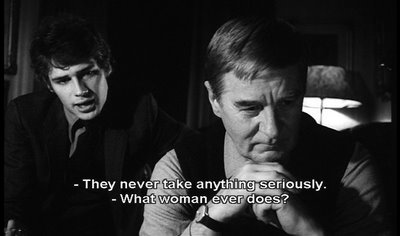
New Yorker Films recently released on DVD two striking Mai Zetterling films which show the Swedish actress to also have been a pioneering director. Loving Couples (1964) interweaves the back stories of three pregnant women who happen to all be in the same hospital at the same time (around the beginning of the 20th century), and also happen to know each other. The gorgeous b&w cinematography—well it can be gorgeous, it's by Ingmar regular Sven Nykvist—reinforces the unblinking sharpness of Zetterling's look at the relations between men and women. (Needless to say, the title is highly ironic.) The movie ends with what looks like a real birth, which I'm sure must have gone over well with 1964 audiences.
But even Loving Couples pales in comparison to The Girls (1968), whose modernity just blew me away. I don't understand why this movie isn't hailed as a prime example of 1960s modernism. Perhaps the DVD will help change that.
The Girls follows a predominently female theater troupe as it tours Lysistrata in Swedish backwater towns and as its leads (Harriet Andersson, Bibi Andersson and Gunnel Lindblom, no less) express a growing feminist consciousness. But the best thing is that Zetterling goes all Godard on us, playing out her manifesto in a way that seems to imply that traditional filmmaking is a tool of the patriarchy and subverting it is a feminist imperative. And so she plays with the superimposition of sound and image (one preceding or following the other for instance), with fantasy sequences, with chronology, with editing. Plus every shot looks incredible, ready for framing—what an eye Zetterling had! The Girls is a triumph of form and function.
Wrapping up my Swedish week was El Perro del Mar at Joe's Pub. Sarah Assbring (who basically is El Perro del Mar, though she was backed on stage by a few guys) plays intimate pop songs that feel like Brill Building anthems with all the fun sucked out of them. She was stylish but dry dry dry, and her stern demeanor hid lightweight songs.
Émilie Simon, who followed her up on stage, was the exact opposite: a serious experimenter (she studied at Pierre Boulez's IRCAM) under a foofy exterior. Simon's released three popular electronic-based albums in her native France, including the original soundtrack for March of the Penguins. Because her musicians got last-minute visa problem, her New York debut also was her live-solo debut as she accompanied herself on guitar or on piano, with some prerecorded stuff coming out of a laptop perched on a chair. She occasionally shot sideway coy glances at the audience while singing in her girlish voice—all things I usually hate in performers but which she managed to pull off, coming across as endearingly kooky rather than clumsily flirtatious.




No comments:
Post a Comment